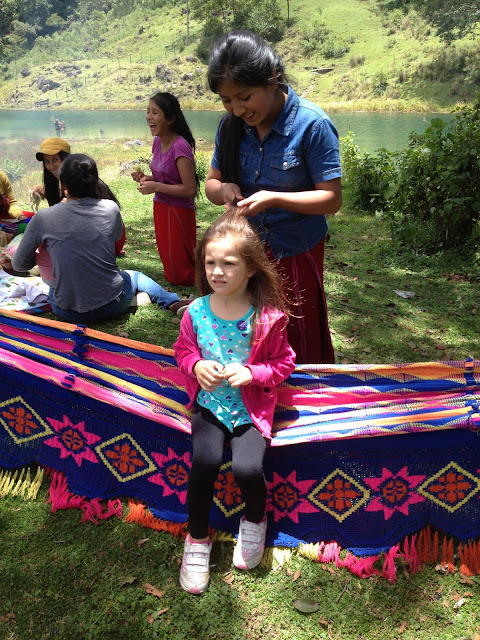 |
| Roasted rabbit at a picnic. |
Many people tell us what great experiences we're providing for our girls. And then the other day I thought more about that, and I questioned this line of thought. They are young. When our 5-year contract ends in 2018 (we're almost exactly half way through it), our girls will be 7, 5, and 3. That's still very young.
Maybe too young to remember anything?
Recently we took a trip to Nebaj, in the highlands of Guatemala. The Ixil people who live in this region were the hardest hit during the civil war. In fact, what happened there is now recognized as genocide, which killed thousands of people and destroyed countless villages. Widespread killings, rape, torture, and "disappearances" were intended to completely wipe out the Ixil people. Ex-president Rios Mont is currently on trial for being the general during this time of genocide and crimes against humanity. Random fact: his daughter was one of the candidates that ran (and lost) for President of Guatemala in elections last Sunday.
In this region, MCC supports two projects through a local Mayan organization. One is a project providing space for young people to learn about farming and traditional agriculture as a way to make a sustainable living, by each working a piece of land. It's a beautiful project where we are seeing youth who want to retain their traditional practices, and want to work hard and make a viable living, so that they can avoid migrating to find work.
The other project is around gender equity, and accompanying Mayan women as they try to rescue some of their traditional practices around medicine and health, while also learning about equality and justice for women, something difficult in such a male-centric culture.
During our trip we visited some land where youth are working hard to cultivate diverse crops. One young woman shared with us how proud she is to work the land and prove to her family that she, as a woman, can not only work the land but produce results. We had to walk along a steep hill for at least 20 minutes to arrive to her small plot of land.
We witnessed a workshop among participants of the project on creating organic fertilizer.
 |
| The girls enjoyed helping. |
 |
| Hazel was a little leery. |
 |
| Look Mom! Sharp sticks! |
Michael was about the age Ellie will be when he and his family returned to the States after being born and living in Peru his whole life. He remembers some things from his time there, stories and images he holds in his mind. But more important than specific memories, his experience of living overseas, his identity of being born in Peru, has stuck with him. It shaped him throughout his childhood back in the States, and into adulthood those experiences integrated into his thoughts and views. It brought us full circle back to Latin America.
And so, even if my girls won't remember every detail, and won't remember every trip we take, and won't remember every person we meet, they will have a bigger lens to interpret their world. They won't think it strange that almost every single friend they have at school has a different skin color than them, and speak Spanish.
 |
They are used to strangers talking to them, carrying them. They travel well and often. They make friends quickly, often with limited language skills. This, I must remember, among the others, will be a life-long skill.
I can only hope and pray that little nuggets of our life here will hold on to their hearts and in their minds as they grow, and I have to trust that these experiences are molding them in more ways than I can see or understand.
That is why we are here.



No comments:
Post a Comment